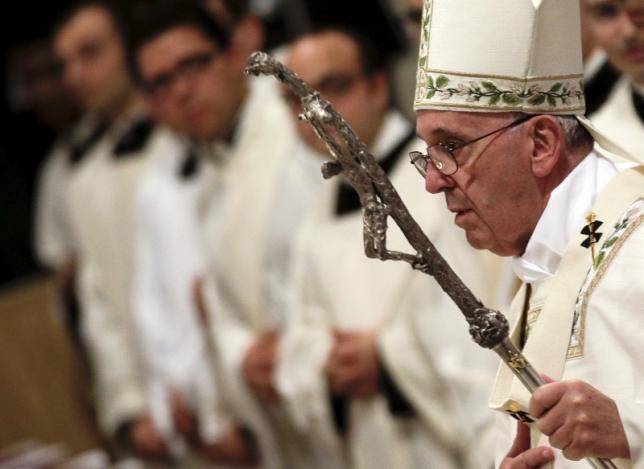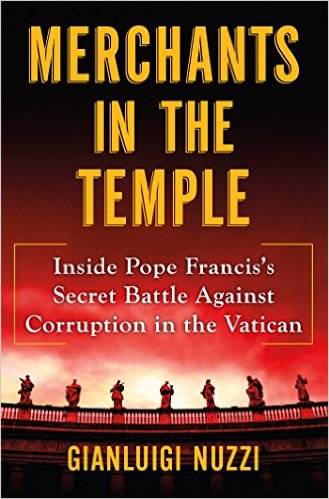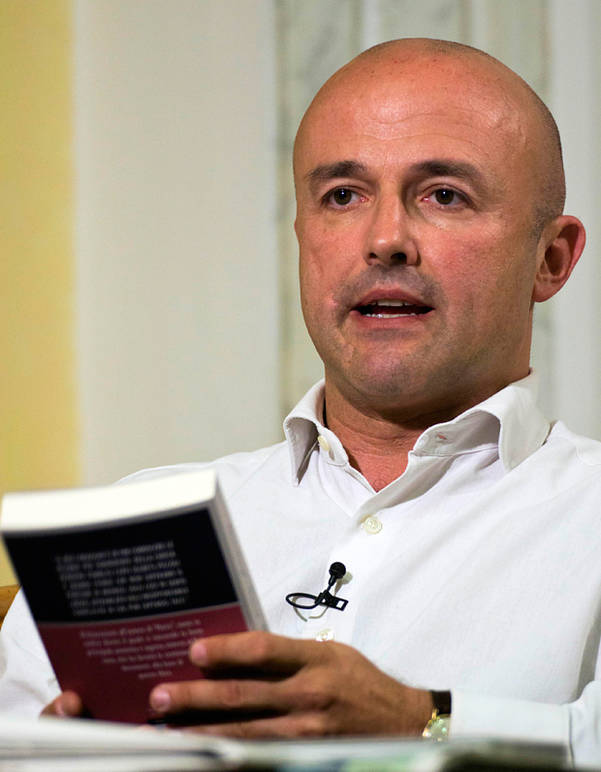Vatileaks, Round Two
ROME -- All eyes this week were turned across the Tiber and toward St. Peter's, where Pope Francis has stumbled twice in the past 10 days, and the Church itself has been bruised by two new books which document alleged grave financial abuse inside the Vatican. The Italian journalists involved are Emiliano Fittipaldi, author of Avarizia, or Avarice, not yet available in English, and Gianluigi Nuzzi, author of Via Crucis, already available in English as Merchants in the Temple, Inside Pope Francis's Secret Battle Against Corruption in the Vatican, published by Henry Holt, $28).
As a result, the Vatican arrested two of its own -- a ranking Roman Curia official and a woman in public relations, who was later released -- and has now launched a judicial inquiry into both authors. The charge, according to Vatican spokesman Fr. Federico Lombardi, is "possible complicity in the crime of divulging confidential news and documents." Lombardi also indicated that the Vatican probe extends into leaks concerning the Administration for the Patrimony of the Holy See (APSA) because "APSA has always cooperated with the competent organs and is not under investigation but continues to conduct its activities in respect to current legal norms." Church spokesmen also deny that Propaganda Fide real estate property is mishandled, and claim that the Vatican regularly pays Italian property taxes. Earnings from its real estate holdings are devolved "totally" to Church missions, and rentals are at normal commercial rates, says Propaganda Fide, albeit with certain exceptions for "indigents."
In defense of the two Italian journalists, Michele Anzaldi, member of Parliament from Premier Matteo Renzi's Partito Demcratico (PD), protested that press freedom is to be "protected everywhere and always." Anzaldi said that he plans to bring the issue before the Chamber of Deputies' Justice Commission. "To learn that two journalists Fittpaldi and Nuzzi are to be investigated by Vatican authorities, and hence by a foreign state, for having published documents that someone wanted to exit from the Vatican raises a lot of questions," said Anzaldi.
These new revelations of financial mismanagement follow in the wake of the embarrassing wave of scandals back in 2012 known as "Vatileaks," which Nuzzi unleashed in his previous book, based upon information from Paolo Gabriele, a butler cum valet in the household of then Pope Benedict XVI, who photocopied thousands of documents which he kept in his home. (Today Gabriele, in a Vatican prison for several months but subsequently pardoned, lives close to the Vatican and has been given a new job in a Vatican-owned hospital.)
"I have nothing to fear," said Fittipaldi, a skilled investigative reporter who writes regularly for the weekly L'Espresso. "I have no knowledge of any international rogatory." In his introduction to Avarizia Fittipaldi claims that the pope must know Vatican finances full well: "He must know that the Vatican owns, in Rome, houses that are worth 4 million euros, and that it's not refugees living there, but VIPs and people with 'recommendations' who pay ridiculously low rents. He must know that the foundations dedicated to Ratzinger [retired Pope Benedict XVI] and to Wojtyla [Pope John Paul II] have grossed so much money that they have over 15 million euros [$16.2 million] in the bank. He must know that there are plenty of cardinals living in apartments of 400, 500 and 600 sq. m., plus penthouse and panoramic terrace. He must know a host of things -- if he does not know something, it is because no one tells him."
Besides discussing alleged financial misdeeds, in his book Nuzzi raises the question of whether Pope Francis may resign. In his view, the new Pope found the Curia, or Church administrative body, in disarray, characterized by "inertias, scandals, thefts, wrongoing, and opaque interests." After hiring professionals to examine Church finances, Francis was nevertheless unable to get many of the reforms he desired off the ground: "Bergoglio's plan to drive out the merchants from the temple was still unfulfilled three years after his election." Many cardinals, Nuzzi avers, admire the pontiff's ability to communicate but simply consider him too far to the left and guilty of inducing "confusion" within the Church.
Nor has consolidation of Vatican finances, one of the Pope's goals, been achieved, with APSA in a tug-of-war with the Secretariat for the Economy over who keeps count of real estate holdings. Nor has a census of the Vatican's heritage of art and archaeology been conducted. "Centralization was still a distant dream, despite the fact that it would prevent the many fiefdoms and feuds that foster private interests and privileges," writes Nuzzi. "Francis may never have imagined that he would encounter such entrenched and tenacious resistance."
(To see for yourself the pontiff stumbling in Piazza San Pietro Nov. 7, see >>> ; for his lesser stumble in the Basilica of San Giovanni, see >>> )




































i-Italy
Facebook
Google+
This work may not be reproduced, in whole or in part, without prior written permission.
Questo lavoro non può essere riprodotto, in tutto o in parte, senza permesso scritto.